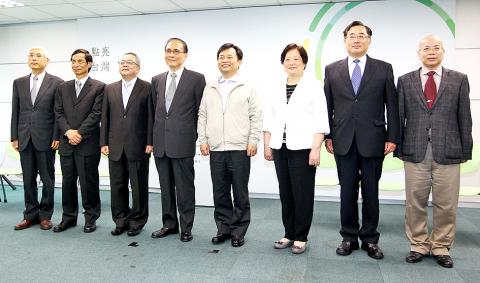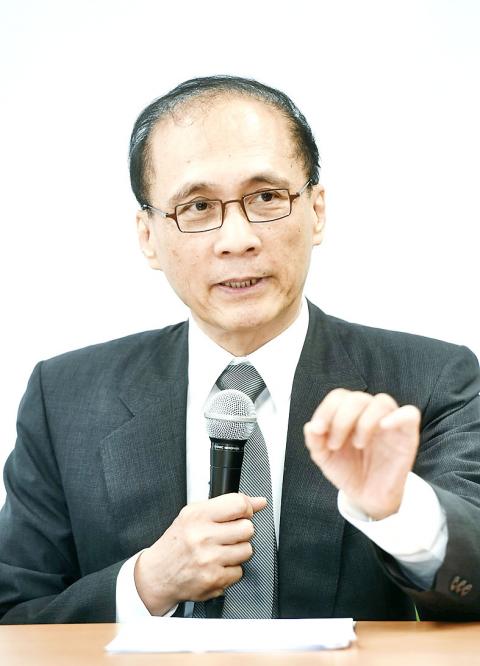Premier-designate Lin Chuan (林全) yesterday introduced eight future Cabinet members, including the vice premier, the Cabinet spokesman, four ministers without portfolio and the future minister of health and welfare, to the media.
Speaking at a news conference yesterday afternoon, Lin introduced the first eight members of his future Cabinet, including future vice premier Lin Hsi-yao (林錫耀), future minister of health and welfare Lin Tzou-yien (林奏延), ministers without portfolio Lin Mei-chu (林美珠), Chang Ching-sen (張景森), Shih Jun-ji (施俊吉) and Hsu Chang-yao (許璋瑤), and future Cabinet spokesman Tung Chen-yuan (童振源) — who did not appear at the press conference as he is currently in the US as a visiting professor.
Lin Chuan said that all of the confirmed Cabinet members have served in government positions at different levels, and that he had worked well with all of them previously.

Photo: CNA
“I worked closely with Lin Hsi-yao during the presidential election, and we had good discussions on various issues,” Lin Chuan said. “I first met him when he was Taipei County’s [now New Taipei City] deputy commissioner, and I was the Directorate-General of Budget, Accounting and Statistics minister. I had a very good impression of him, since he could appear soft when trying to convince people, but remains firm over his views.”
Having served not only as deputy county commissioner, but also several positions in the Democratic Progressive Party (DPP), as well as in the Cabinet during the previous DPP administration, Lin Chuan said that Lin Hsi-yao is good at negotiating, and could be very helpful in facilitating communications in the Cabinet and with the legislature.
As for Chang, Lin Chuan said that, as a former head of the Council for Economic Planning and Development — now renamed the National Development Council — he would play a key role in planning for national development, transportation, energy and social housing.

Photo: Fang Pin-chao, Taipei Times
Asked whether his appointment of Lin Mei-chu as a minister without portfolio would entail a conflict of interest, since Lin Mei-chu is Tsai’s cousin, Lin Chuan said that Lin Mei-chu would be serving in the Executive Yuan, not the Presidential Office.
“Professionalism, ability and experience are the only conditions I would consider,” the premier-designate said.
Lin Chuan also said that the decisions on future Cabinet members are not made by any one person.
“We have a team — I am not going to name everyone on the team, but Tsai and I are both on it — to make proposals and discuss possible candidates,” Lin Chuan said.
“Tsai and I often have different ideas, but I have the final say on it,” the premier-designate added.
Meanwhile, Lin Tzou-yien said that he had not attended a WHA meeting before, but that he would ask Minister of Health and Welfare Chiang Been-huang (蔣丙煌) for advice, and that because he considers himself familiar with the work, he expects the trip to go smoothly.
In response to whether Taiwan would have to attend the meeting under the “one China” principle, Lin Tzou-yien said he has not received the invitation yet, and because he would ask for Chiang’s advice in advance, he does not want to make any remarks on the issue yet.
Additional Reporting by Lee I-chia

‘FORM OF PROTEST’: The German Institute Taipei said it was ‘shocked’ to see Nazi symbolism used in connection with political aims as it condemned the incident Sung Chien-liang (宋建樑), who led efforts to recall Democratic Progressive Party (DPP) Legislator Lee Kun-cheng (李坤城), was released on bail of NT$80,000 yesterday amid an outcry over a Nazi armband he wore to questioning the night before. Sung arrived at the New Taipei City District Prosecutors’ Office for questioning in a recall petition forgery case on Tuesday night wearing a red armband bearing a swastika, carrying a copy of Adolf Hitler’s Mein Kampf and giving a Nazi salute. Sung left the building at 1:15am without the armband and apparently covering the book with a coat. This is a serious international scandal and Chinese

SECURITY: As China is ‘reshaping’ Hong Kong’s population, Taiwan must raise the eligibility threshold for applications from Hong Kongers, Chiu Chui-cheng said When Hong Kong and Macau citizens apply for residency in Taiwan, it would be under a new category that includes a “national security observation period,” Mainland Affairs Council (MAC) Minister Chiu Chui-cheng (邱垂正) said yesterday. President William Lai (賴清德) on March 13 announced 17 strategies to counter China’s aggression toward Taiwan, including incorporating national security considerations into the review process for residency applications from Hong Kong and Macau citizens. The situation in Hong Kong is constantly changing, Chiu said to media yesterday on the sidelines of the Taipei Technology Run hosted by the Taipei Neihu Technology Park Development Association. With

A US Marine Corps regiment equipped with Naval Strike Missiles (NSM) is set to participate in the upcoming Balikatan 25 exercise in the Luzon Strait, marking the system’s first-ever deployment in the Philippines. US and Philippine officials have separately confirmed that the Navy Marine Expeditionary Ship Interdiction System (NMESIS) — the mobile launch platform for the Naval Strike Missile — would take part in the joint exercise. The missiles are being deployed to “a strategic first island chain chokepoint” in the waters between Taiwan proper and the Philippines, US-based Naval News reported. “The Luzon Strait and Bashi Channel represent a critical access

COUNTERINTELLIGENCE TRAINING: The ministry said 87.5 percent of the apprehended Chinese agents were reported by service members they tried to lure into becoming spies Taiwanese organized crime, illegal money lenders, temples and civic groups are complicit in Beijing’s infiltration of the armed forces, the Ministry of National Defense (MND) said in a report yesterday. Retired service members who had been turned to Beijing’s cause mainly relied on those channels to infiltrate the Taiwanese military, according to the report to be submitted to lawmakers ahead of tomorrow’s hearing on Chinese espionage in the military. Chinese intelligence typically used blackmail, Internet-based communications, bribery or debts to loan sharks to leverage active service personnel to do its bidding, it said. China’s main goals are to collect intelligence, and develop a